|
|
Busting, Andy Hardy, and Gog
Sitting here in my officially sanctioned Robert Young Perm-A-Rest Lounger®, in my fire-lit, book-lined study, my faithful dogs soundly asleep at my feet as I puff away on my officially sanctioned Fred MacMurray E-Z Calm AsbestoPipe®, admiring my row after row of Warner Archive Collection, M-G-M Limited Edition Collection, and Sony Columbia Classics M.O.D.s―which are of course alphabetized and separated from my ordinary DVD rabble, attractively illuminated in pink and blue on their knotty pine shelves by my officially sanctioned Jayne Mansfield Ba-Zooms-In Baby Spotlights®―I drifted back to a time when classic and cult movie-watching was an at-best chancy, catch-as-catch-can proposition.
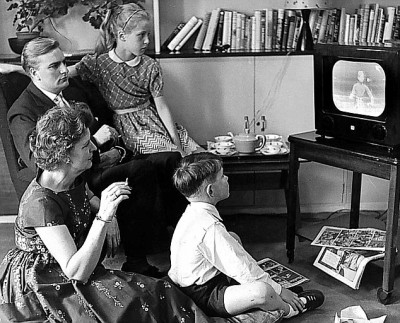 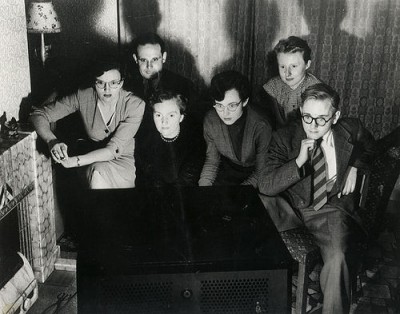
Not too long ago (around the time of the Punic Wars), before downloads, before DVDs, before satellite, before VHS, before laser disc, before cable, there was...broadcast television, where various independent and network-owned stations offered up a steady diet of commercials, series, old movies, Mass for Shut-Ins, and more commercials―seven days a week, 20-hours a day. Now, there were certain days and certain times during the week (at least in my TV market...but it was pretty standard all over the country) where you could depend on seeing the kinds of movies you can now easily order from the studios' M.O.D. services. However...you had to park yourself in front of the TV at those times to see them: if you were late, or there was another show on a different channel, you were out of luck―and maybe for good with that particular, fleeting title. If you had a decent independent channel in your area, Sunday mornings were good for family movies like Warners' The Andy Hardy Collection, Volume 1. Weekdays in the afternoon (say around 3:00 or 4:00), someone's station usually offered a Big Show or Afternoon Movie or best of best, Dialing for Dollars Movie―a nice alternative to the cartoons and syndicated sitcoms playing elsewhere, and a good place to catch some of the "newer," bigger-budgeted studio movies from the '50s like The Big Caper or Tall Story. Saturday afternoons usually had a horror/sci-fi show (Sir Graves Ghastly!) where you could catch something like The Magnetic Monster or Gog. Friday and Saturday nights' Late, Late Shows were good venues for some of the "edgier" action and, um...more "adult" offerings like Impasse or The First Time, while the weekly mid-morning movie shows like Detroit's beloved Bill Kennedy at the Movies―perfect for a day home from school―had all the old Warner Bros. and MGM mellers and musicals like You Can't Get Away With Murder and Rhapsody in Blue for the housewives to peek in on while they vacuumed and dusted and did the laundry.
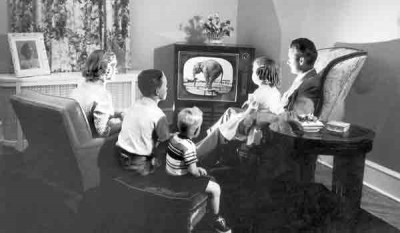 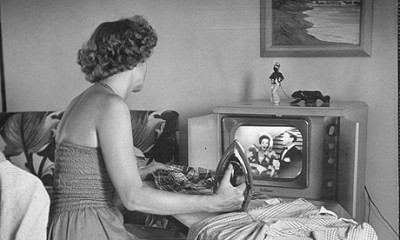
What a god-awful time for movie-watching. Actually, that's true and not true. Movie lovers who grew up when I did will tell you that catching a movie on TV was kind of special back then, because you only had one shot at it. If a movie you had been dying to see showed up on TV Guide's schedule, planning your day to watch it was an anticipatory treat. Even better: you never knew what might happen when you tuned in: if Busting was on Friday night at 11:30, and your parents were asleep and someone at the station screwed up and didn't edit the print right, allowing you to actually hear a swear word or two, that was big stuff back then. But truth be told, as much as I enjoy nostalgia...it's better now, and M.O.D.s are a perfect illustration of better living through technology. The impossible-to-find movie you want to see and to own and to watch over and over again at any time of the day or night, uncut and commercial free (and even in its proper screen ratio) can be yours with a simple click of the mouse. Maybe some day soon, when movies are pumped right into our skulls ("Honey...I picked my nose and accidentally ordered up Lorenzo Lamas' Body Rock again,"), people will be nostalgic for M.O.D. discs like I'm occasionally wistful about those old TV movie-watching days. Right now, though, the best way to indulge your cult and library title cravings is to order a manufactured-on-demand disc pronto, and The M.O.D. Squad is the first and best place you should check out for all your buying recommendations!
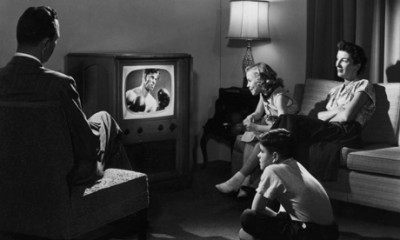 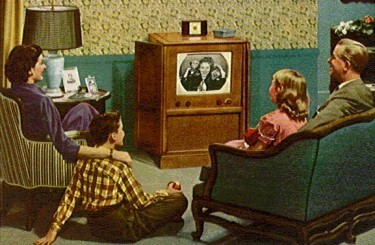

It's been a few months since the last M.O.D. Squad column (proof there is a god), so we have loads of one-stop reviews for you. Let's dig in! First up is a spotlight review of director Peter Hyams' neglected cop actioner classic from 1974, Busting, from M-G-M's Limited Edition Collection
M.O.D. Squad Spotlight
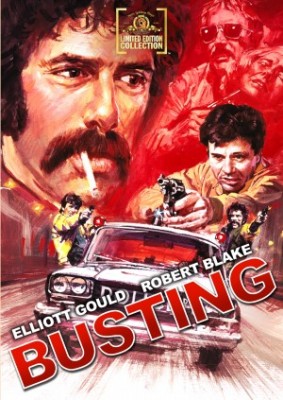 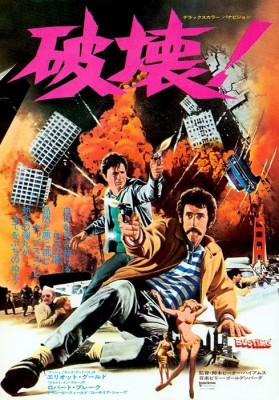
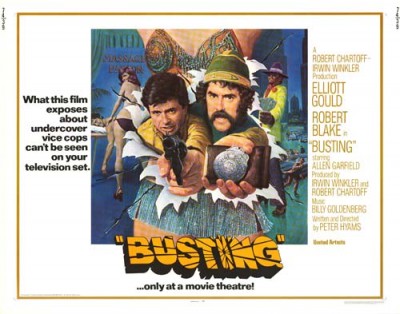
BUSTING
"You guys have been watching too many moving picture films."
An overlooked gem from the violent, cynical '70s...and a personal favorite of mine. M-G-M's own M.O.D. (manufactured on demand) service, the Limited Edition Collection, for hard-to-find library and cult titles, has released Busting, the 1974 buddy cop actioner from United Artists, written and directed Peter Hyams, and starring Elliott Gould, Robert Blake, Allen Garfield, Antonio Fargas, Michael Lerner, and Sid Haig. Terrifically exciting and completely depressing in equal doses, Busting's suffocating pessimism about "law and order," and where two ordinary cops fit into that rigged system, is relentless; this one ranks right up there with the other greats from that "golden decade" of cop movies. An original trailer is included in this okay widescreen transfer.
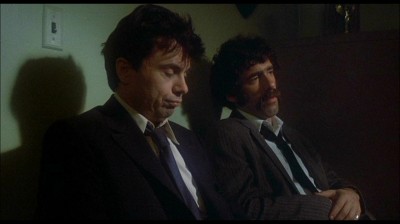
L.A. Vice detectives Keneely and Farrel (Elliott Gould and Robert Blake) know they have a solid bust with gorgeous, high-priced hooker Jackie Faraday (Cornelia Sharpe). They've been tapping her phone for a month, and now they need her latest trick, Dr. Berman, D.D.S. (Logan Ramsey), who just nailed Jackie in his dentist chair (insert your own dental joke here), to set up Keneely as a trustworthy new client. They bust Jackie, and begin to wreck her apartment until she coughs up her little black appointment book...filled with the names of prominent L.A. citizens, including some in the D.A.'s office. Before you know it, Keneely and Farrel are hauled into their superior's office, Sergeant Kenefick (John Lawrence), where it is strongly suggested they lie under oath to sabotage their case against Jackie. You see, to satisfy the higher-up officials who answer to slimy gangster Carl Rizzo (Allen Garfield)―who seemingly has everyone on the payroll―this case needs to just...go away. Just to bring home the point as to whom is really in charge, Keneely and Farrel start pulling some dirty duty, including busting a rough-and-tumble gay bar and watching out for perverts in a public park's toilet. Aware that they're completely alone, they decide to work off hours to nail Rizzo, hounding him at every turn in the hopes of forcing his hand with an upcoming dope score.
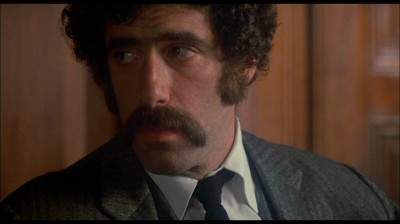 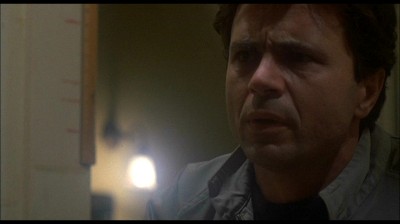
A favorite since I saw it at the drive-in when I was a kid, and one of my "holy grails" of missing DVDs now fulfilled, watching Busting in its correct widescreen ratio after I don't know how many years, I was even more impressed by the artful combination of thrills and cynical depression (a tough act to make work) that writer/director Peter Hyams pulled off with his first major big-screen directorial assignment (perhaps not surprising, either, when you factor in the veteran producers Robert Chartoff and Irwin Winkler, responsible up to that time for gritty, intelligent hits like They Shoot Horses, Don't They?, The New Centurions, and The Mechanic). Criminally not nearly as well known as its comedic doppelganger from the same year, director Richard Rush's delightfully droll Freebie and the Bean, Busting came out in February of 1974 to little business and mixed critical reception, while Freebie and the Bean, sporting two arguably "hotter" box office stars (James Caan and Alan Arkin), and reportedly held up so as not to compete with Busting, was released in December where it quickly became one of Warner Bros.' biggest hits of the year (although the critics liked it even less than Busting). Having just watched Freebie and the Bean for the umpteenth time a few weeks ago (another "holy grail" saved by M.O.D. services), it's easy to see why audiences would go for that deliberately goofy speedball, while staying away from the blackly funny but morose, futile Busting.
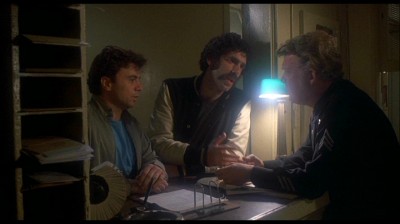 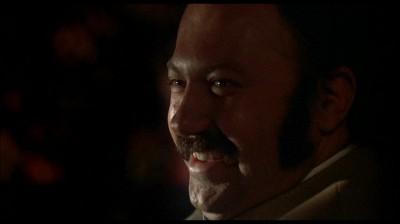
Produced and released at the approaching nadir of American cynicism and depression over the developing Watergate scandal and the ongoing Vietnam crisis, Busting's gestalt is pure early '70s American pessimism for anything that smacks of authority or "establishment." What separates Busting from other cop movies at that time that looked askance at the then-current state of law and order in America, such as Dirty Harry (where Harry had to watch helplessly as the courts sided with the attackers rather than the victims), is that Keneely and Farrel have no one on their side: not the courts, not the public, not even their own police force. No one has their back. They're completely alone in their commitment to following the law, with a growing, numbed shock of realization that even their brothers-in-arms―their fellow cops―are actively working with the criminals to at the very least humiliate them...if not to get them killed outright ("We're so f*cking alone on this thing it ain't even a joke," Blake dejectedly says to a zoned-out Gould). Rizzo runs the show, and through his pay-offs to the higher-ups in politics, the courts, and the police department, he can get any of Keneely and Farrel's busts written off without a ripple of complaint from the lower men on the totem pole who have to answer to their own corrupt superiors, or lose their jobs (the team's immediate superior says he has one job: pick up his phone that's connected to the higher-ups and answer, "Yes, sir," to anything that's said).
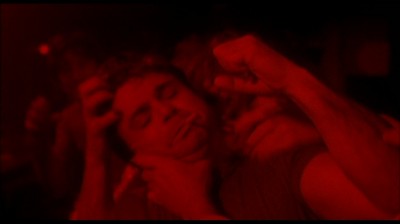 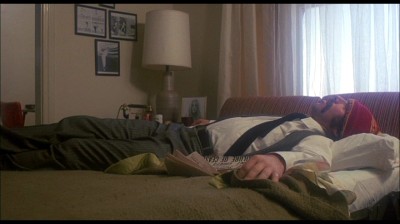
Everything in Busting is illegal and corrupt. When Keneely and Farrel bust the gorgeous hooker Jackie (lynx-eyed beauty Cornelia Sharp, looking socko in the buff), all it takes is a "someone made a phone call" threat from their immediate superior, and they know the jig is up. They ignore the Sergeant's suggestion they change their testimony (the sergeant who's smoking illegal mail-order Cuban cigars), but when they find that Jackie's little black book has been replaced with a fresh, clean one down at the Evidence Desk, Keneely finally sees how deep the fix goes ("He knows, everybody knows!" he disgustedly taunts, as he throws the counterfeit book at the on-the-take evidence sergeant, played to perfection by the gruff Richard X. Slattery). With the evidence destroyed by their very own, Keneely and Farrel no longer have a case, and Gould has to "throw" his testimony on the stand, to his own deep shame (Gould gets to do a bit of "Elliott Gould shtick" after this scene, leaving the courtroom and giving a sardonic, hallelujah reading of The Pledge of Allegiance before attacking a pimp who laughs at him). Even the crooks look at Keneely and Farrel with dulled astonishment that they're stupid enough to buck the system that's in place. When they go to bust a porno shop that features prostitution and drug dealing in the back, manager Marvin (the delightfully weasely Michael Lerner), who spots the undercover Farrel as a cop the second he walks in, chides Blake with a school marmish, "You know you're not supposed to come in here," unafraid to even name his protector, "Rizzo won't like that," because he knows Rizzo is immune. They can't even get the crooked evidence sergeant to get a warrant to search Marvin's place for drugs, because he obstinately stalls them by insisting he's not going to wake the judge up at 1:00am. So Keneely and Farrel search anyway (precipitating the movie's pulse-pounding central chase scene), and once they have the perps trapped in a building, the back-up they called for (two measly uniforms are sent) deliberately let the crooks go, forcing an enraged Keneely to call them "pigs" (and when Keneely forces the issue about the uniformed officers, their superior refuses to hear the complaint).
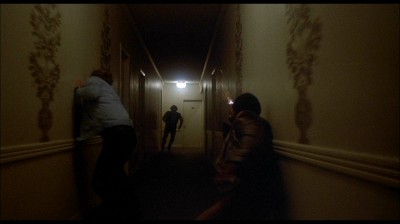 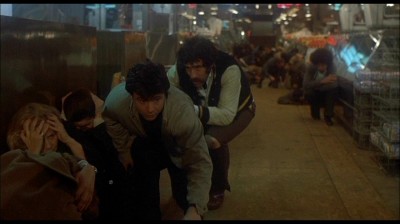
In screenwriter Hyams' world, Keneely and Farrel aren't even allowed the solace of self-denial in their efforts to bust Rizzo; they know they're completely ineffectual as vice officers because all the other cops are actively working with the criminals (Blake sneers, "Big tough cops," as he commiserates with Gould about how they can't even keep the hookers off the streets because Rizzo gets them released immediately). Busted down to humiliating toilet duty to catch perverts in the park, they still stay on Rizzo ("We sure made mincemeat outta him," Farrel fatalistically jokes after they fail to shake the gangster during a threatening interview)...but he just laughs at them, openly mocking them for their gung-ho idealism, because he's already in solid with the authorities ("What's funny is, you guys really think you're doing something," Rizzo jeers). The ending MAJOR SPOILERS AHEAD drives this point home brilliantly, with Rizzo, well and truly busted for dealing drugs in his hospital room, laughing at a disbelieving Keneely as he lays out exactly how's he's going to beat Keneely's bust. Director Hyams' freeze-frame ending on Gould's pissed-off face, with the soundtrack flash-forwarding to ex-cop Keneely applying for a civilian job, leaves absolutely no room for the audience to celebrate anything Gould or Blake did during the movie. It was all for nothing. The concept of "law and order" simply doesn't exist if you can just buy it off.
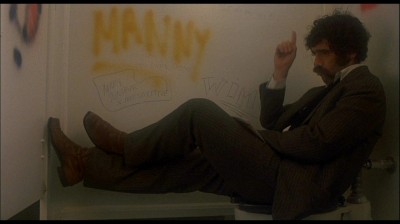 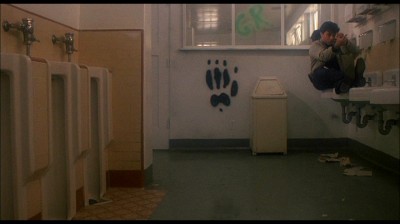
Busting's production design matches its dyspeptic moral outlook, with cinematographer Earl Rath (lots of noted, and now classic, television assignments, like Go Ask Alice, Gargoyles, and The Waltons' pilot, The Homecoming: A Christmas Story), pushing the grain and fuzzy, diffused lighting through a sea of grimy greens and yellows and reds and blacks. Director Peter Hyams, who also worked in television prior to this first assignment, immediately establishes his penchant for kinetic action sequences with several remarkable set pieces here, particularly the astounding central chase that has Rath's camera wildly dollying down narrow hallways as criminals run past and then back in front of the camera, blasting guns as the visual schematic takes front-and-back as well as lateral movement, the excitement level rising with the help of that sick, funky groove theme by noted composer Billy Goldenberg (Rath isn't using Steadycam here...because it wasn't on the market yet, but you might think so). Hyams takes the chase to L.A.s' famed Farmer's Market, where he slows the dollys down as Gould and Blake stalk the criminals, with terrified on-lookers crouching in frozen fear as Hyams sinuously glides his camera along the crowded stalls. It's a remarkable sequence, much imitated over the years by other directors (Hyams would elaborate on this technique in his other films, most notably in the sci-fi remake of High Noon, Outland, where Sean Connery has a similarly exciting foot chase), and it's bolstered by Hyams' sure hand in keeping Busting exciting throughout...even when its central message and tone are such downers.
 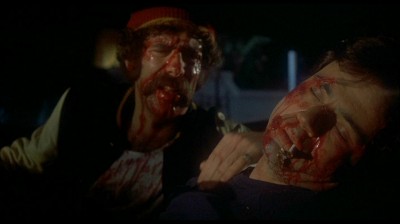
As for the leads, Gould and Blake are an inspired, if deliberately low-key, pairing. Busting came at an interesting period in their careers. Top-billed Elliott Gould, having captured the critics' and the public's imagination with his quirky, non-traditional movie star looks and charm in big hits like Paul Mazursky's Bob & Carol & Ted & Alice and Robert Altman's M*A*S*H, was by 1974 completely overexposed, running through too many film projects that were receiving at best mixed reviews from the critics and more worryingly, little response from the public: I Love My Wife, Getting Straight, Little Murders, Who?, a misplaced M*A*S*H retread, S*P*Y*S, and two brilliant but sadly neglected Robert Altman classics, California Split and the noir The Long Goodbye (his leading man status in A-list pictures wouldn't really recover from this period of oversaturation). Blake's position was even more perilous than Gould's by 1974. Having scrabbled his way back from early fame as a kid performer in the Our Gang comedies, and, after working through supporting roles in films like A Town Without Pity, PT 109, and The Greatest Story Ever Told, Blake had hit the critical big time in 1967 with his masterful lead work in Richard Brooks' riveting In Cold Blood. Starring roles followed, such as Tell Them Willie Boy is Here and in 1973 (like Gould's The Long Goodbye), Blake's own neglected classic, Electra Glide in Blue, but his film work was sporadic and unsuccessful at the box office. Indeed, Busting's failure would lead Blake to return to TV for the most iconic role of his career: Baretta.
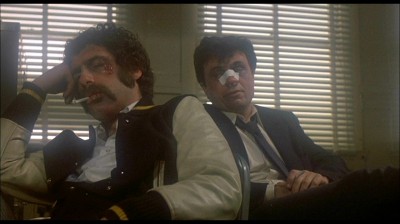 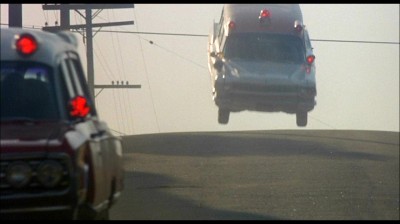
Together, Blake and Gould aren't excessively cute or even "buddy buddy" acting here; their low-key demeanor is more in keeping with Busting's overall tone. They're consistently amusing, though, with Gould doing his "Groucho Marx-as-basketball-player" bent leg and gum-chewing shtick (Hyams makes sure we get a briefly funny shot of Gould getting a stick during the Farmer's Market sequence), and Blake acting tough with his unlit cigarette and his little pre-Baretta one-liners. "Film" students (yeech) looking for a quick term paper subject the night before can make a lot out of Hyams' pushing the boundaries of the subliminal homoerotic underpinnings of the "buddy film" genre when he has the boys here dancing with each other in a gay bar (it's played for laughs, until Hyams gets serious with a scary bar fight, shot in sick neon red, as the tough drag queens beat the living sh*t out of Gould and Blake). If I had one small complaint about Busting, it would be that comparative scenes with Blake seem to be missing. We get Gould speaking about his idealism as a young cop, and a good silent sequence of Gould, shamed by his false testimony, going home to his anonymous, cramped apartment and crashing on his sofa bed...but not a glimpse of Blake off-duty (the final freeze-frame also focuses exclusively on Gould's future fate, not Blake's). It's a minor point, though, and one that doesn't detract from Busting's overall, significant achievement.
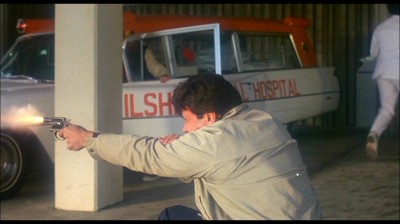 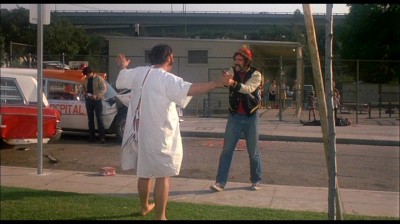
The DVD:
The Video:
When Busting used to show up on TV, some shots in the gay bar scene would be excised (after some minor complaints from activist groups at the time of the movie's release), with some "new" material added to pad out the running time (I remember Blake talking to a kid at the park, telling him to get some vitamin C for his cold). As far as I can tell, Busting is complete here, with the gay bar scene intact (and the vitamin C stuff gone). The anamorphically-enhanced, 1.85:1 widescreen image looks grainy and soft...but it was shot that way, so overall, it's a solid transfer, with some minor screen anomalies like scratches and dirt.
The Audio:
The Dolby Digital English mono audio track is acceptable, with little or no hiss, and a strong re-recording level. No subtitles or closed-captions available.
The Extras:
There's an original trailer included here―a good one, too, that really sells the picture.
Final Thoughts:
An overlooked, neglected classic; one of the best cop movies of the '70s―and that means it's one of the best cop movies ever. Director and screenwriter Peter Hyams creates a dyspeptic, sordid world (probably not too far from the truth) where everyone is either on the take or afraid to speak up, and where the efforts of two crusading cops don't amount to squat. Terrifically exciting and depressing as hell, all at the same time, with two perfectly cast leads. A knockout. On content alone, I'm giving Busting our highest ranking here at DVDTalk: the DVD Talk Collector Series award.
Recent M.O.D. Reviews
DVDTalk editor John Sinnott looked at The Magnetic Monster, the 1953 Curt Siodmak monster flick starring Richard Carlson, King Donovan, and Jean Byron, and its "sequel," if you will, Gog, from 1954, starring Richard Egan, Herbert Marshall, and Constance Dowling:
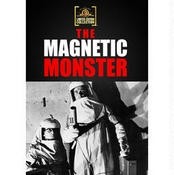 When people think of 50's sci-fi B-movies, they conjure up images of really poor special effects and monsters that obviously look like a guy in a costume that was created in someone's garage. That wasn't always the case though, and one good counter example is The Magnetic Monster, a picture released through United Artists that has recently seen the light of day once again through M-G-M's M.O.D. program. This is a well-scripted solid SF film, rumored to have been a pitch for a TV series, about a government organization of scientists, the OSI, that was in charge of tracking down strange and unusual phenomena in the atomic age. Much better than the typical 50's SF low-budget fare, the movie has ironically been largely forgotten. Hopefully this release will remedy that situation.
When people think of 50's sci-fi B-movies, they conjure up images of really poor special effects and monsters that obviously look like a guy in a costume that was created in someone's garage. That wasn't always the case though, and one good counter example is The Magnetic Monster, a picture released through United Artists that has recently seen the light of day once again through M-G-M's M.O.D. program. This is a well-scripted solid SF film, rumored to have been a pitch for a TV series, about a government organization of scientists, the OSI, that was in charge of tracking down strange and unusual phenomena in the atomic age. Much better than the typical 50's SF low-budget fare, the movie has ironically been largely forgotten. Hopefully this release will remedy that situation.
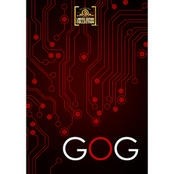 One year after The Magnetic Monster was released, the producer, Ivan Tors, made a sequel of sorts, Gog. This film also featured an agent from the OSI investigating some mysterious occurrences but Tors was able to avoid the major misstep of the first film: this one is much more visually interesting. Too bad it's not nearly as exciting and way too talky. Even so, this M-G-M Limited Edition Collection M.O.D. disc is great and goes well with Tors' earlier film; they make a terrific pair.
One year after The Magnetic Monster was released, the producer, Ivan Tors, made a sequel of sorts, Gog. This film also featured an agent from the OSI investigating some mysterious occurrences but Tors was able to avoid the major misstep of the first film: this one is much more visually interesting. Too bad it's not nearly as exciting and way too talky. Even so, this M-G-M Limited Edition Collection M.O.D. disc is great and goes well with Tors' earlier film; they make a terrific pair.
Stuart Galbraith IV reviewed Thirteen Women, the 1932 cult horror movie starring Myrna Loy, Irene Dunne, and Ricardo Cortez, Three Came To Kill, the 1960 Cameron Mitchell intriguer, 1961's cheap-but-efficient noir, You Have to Run Fast, from director Edward L. Cahn, Jungle Heat, a spy programmer from 1957, and Ray Milland's Hostile Witness from 1968:
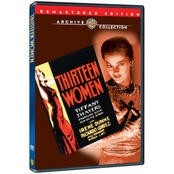 A deliriously lurid, pre-Code thriller with supernatural elements, Thirteen Women plays like a prehistoric antecedent to the "body count" films of the 1970s and '80s. Irene Dunne, Ricardo Cortez, and Myrna Loy star in this RKO production, based on Tiffany Thayer's "startling book." The film may originally have been released at 73 minutes, but all that survives today is a fast-paced 59-minute version. A Warner Archive Collection manufactured-on-demand title, the full-frame, black-and-white Thirteen Women gets a solid, all-region video transfer though, alas, there are no extra features.
A deliriously lurid, pre-Code thriller with supernatural elements, Thirteen Women plays like a prehistoric antecedent to the "body count" films of the 1970s and '80s. Irene Dunne, Ricardo Cortez, and Myrna Loy star in this RKO production, based on Tiffany Thayer's "startling book." The film may originally have been released at 73 minutes, but all that survives today is a fast-paced 59-minute version. A Warner Archive Collection manufactured-on-demand title, the full-frame, black-and-white Thirteen Women gets a solid, all-region video transfer though, alas, there are no extra features.
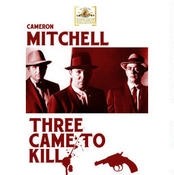 An efficient little thriller from the team of producer Robert E. Kent, writer Orville Hampton, and director Edward L. Cahn , Three Came to Kill offers a tautly-told, intriguing little story perfectly suited to its limited budget. Though a bit flamboyant, Cameron Mitchell is excellent in the leading role, and like other Kent/Hampton/Cahn collaborations the climax is violent and action-packed. A Limited Edition Collection manufactured-on-demand title from M-G-M, Three Came to Kill sources what seems to be a comparatively recent transfer but it's in the wrong aspect ratio, 1.33:1 full frame when it should be 1.66:1 enhanced widescreen. Fortunately, Three Came to Kill reformats to 1.78:1 reasonably well. The picture remains reasonably sharp zoomed in though the cropping is a bit tight here and there. No extras.
An efficient little thriller from the team of producer Robert E. Kent, writer Orville Hampton, and director Edward L. Cahn , Three Came to Kill offers a tautly-told, intriguing little story perfectly suited to its limited budget. Though a bit flamboyant, Cameron Mitchell is excellent in the leading role, and like other Kent/Hampton/Cahn collaborations the climax is violent and action-packed. A Limited Edition Collection manufactured-on-demand title from M-G-M, Three Came to Kill sources what seems to be a comparatively recent transfer but it's in the wrong aspect ratio, 1.33:1 full frame when it should be 1.66:1 enhanced widescreen. Fortunately, Three Came to Kill reformats to 1.78:1 reasonably well. The picture remains reasonably sharp zoomed in though the cropping is a bit tight here and there. No extras.
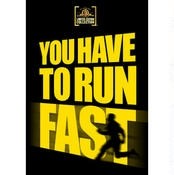 Undistinguished but not bad, You Have to Run Fast is a late-entry noir, produced on the cheap (probably in the $100,000 range) by that prolific triumvirate of producer Robert E. Kent, director Edward L. Cahn, and (usually) writer Orville H. Hampton. Though hardly classics, their dozens of films together during the late 1950s and early-'60s were usually efficient programmers, a few of which (It! The Terror from Beyond Space, Riot in Juvenile Prison) achieved some minor degree of fame. Modestly entertaining, You Have to Run Fast is well directed and offers a very lively if at times absurd and unintentionally funny climax. An M-G-M Limited Edition Collection manufactured-on-demand release, You Have to Run Fast gets a very decent, 16:9 enhanced widescreen transfer though, not surprisingly, no extra features.
Undistinguished but not bad, You Have to Run Fast is a late-entry noir, produced on the cheap (probably in the $100,000 range) by that prolific triumvirate of producer Robert E. Kent, director Edward L. Cahn, and (usually) writer Orville H. Hampton. Though hardly classics, their dozens of films together during the late 1950s and early-'60s were usually efficient programmers, a few of which (It! The Terror from Beyond Space, Riot in Juvenile Prison) achieved some minor degree of fame. Modestly entertaining, You Have to Run Fast is well directed and offers a very lively if at times absurd and unintentionally funny climax. An M-G-M Limited Edition Collection manufactured-on-demand release, You Have to Run Fast gets a very decent, 16:9 enhanced widescreen transfer though, not surprisingly, no extra features.
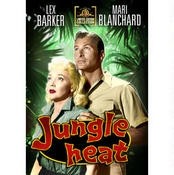 The story goes that Jungle Heat was shot in Hawaii immediately after 1957's Voodoo Island, another Bel-Air production executive produced by Aubrey Schenck and Howard W. Koch, the latter serving as this film's director. Like Voodoo Island, a dull picture top-lining Boris Karloff, Jungle Heat has an interesting cast (actor Rhodes Reason appears in both, in fact) and Kauai, Hawaii locations but otherwise is quite lackluster. Characters mull about, talking to one another, but the story never seems to be going anywhere. With its undercurrent of Japanese fifth columnists threatening plantation owners in the days prior to Pearl Harbor, Jungle Heat at first seems promising but overall it's very disappointing. A Limited Edition Collection manufactured-on-demand title from M-G-M, Jungle Heat sources an old, old transfer, complete with '80s era UA logo, that's 1.37:1 full-frame when it should be 16:9 enhanced widescreen. The transfer is as lackluster as the movie. No extras.
The story goes that Jungle Heat was shot in Hawaii immediately after 1957's Voodoo Island, another Bel-Air production executive produced by Aubrey Schenck and Howard W. Koch, the latter serving as this film's director. Like Voodoo Island, a dull picture top-lining Boris Karloff, Jungle Heat has an interesting cast (actor Rhodes Reason appears in both, in fact) and Kauai, Hawaii locations but otherwise is quite lackluster. Characters mull about, talking to one another, but the story never seems to be going anywhere. With its undercurrent of Japanese fifth columnists threatening plantation owners in the days prior to Pearl Harbor, Jungle Heat at first seems promising but overall it's very disappointing. A Limited Edition Collection manufactured-on-demand title from M-G-M, Jungle Heat sources an old, old transfer, complete with '80s era UA logo, that's 1.37:1 full-frame when it should be 16:9 enhanced widescreen. The transfer is as lackluster as the movie. No extras.
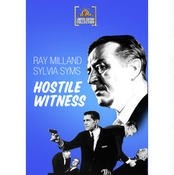 A mostly tepid courtroom meller starring and directed by Ray Milland, Hostile Witness, based on a play, lacks flair and is unimaginatively cast. It's not terrible and has its moments, but Billy Wilder's Witness for the Prosecution or your average episode of Rumpole of the Bailey is a lot more fun. An M-G-M Limited Edition Collection manufactured-on-demand release, Hostile Witness is presented in 1.78:1 enhanced widescreen, approximating its original widescreen theatrical aspect ratio. The transfer is a bit dirty but otherwise fine. No extras.
A mostly tepid courtroom meller starring and directed by Ray Milland, Hostile Witness, based on a play, lacks flair and is unimaginatively cast. It's not terrible and has its moments, but Billy Wilder's Witness for the Prosecution or your average episode of Rumpole of the Bailey is a lot more fun. An M-G-M Limited Edition Collection manufactured-on-demand release, Hostile Witness is presented in 1.78:1 enhanced widescreen, approximating its original widescreen theatrical aspect ratio. The transfer is a bit dirty but otherwise fine. No extras.
Nick Hartel looked at Enter the Ninja, the 1981 chop-socky flick starring Franco Nero and Sho Kosugi:
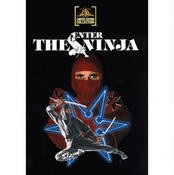 1981's Enter the Ninja, the Menahem Golan-directed (of Golan-Globus fame) production kick-started the career of B-movie star Sho Kosugi who went on to make a number of more visceral ninja films. Rounding up Franco Nero as the mostly silent hero, Enter the Ninja has a few pacing issues, but delivers the goods and then some, particularly in the opening 10-minutes and finale, culminating in a mano-a-mano ninja showdown. M-G-M's Limited Edition Collection release features a visually pleasing 1.85:1 anamorphic widescreen transfer and serviceable English 2.0 soundtrack. Enter the Ninja is a solid addition to the collection of any B-movie fan.
1981's Enter the Ninja, the Menahem Golan-directed (of Golan-Globus fame) production kick-started the career of B-movie star Sho Kosugi who went on to make a number of more visceral ninja films. Rounding up Franco Nero as the mostly silent hero, Enter the Ninja has a few pacing issues, but delivers the goods and then some, particularly in the opening 10-minutes and finale, culminating in a mano-a-mano ninja showdown. M-G-M's Limited Edition Collection release features a visually pleasing 1.85:1 anamorphic widescreen transfer and serviceable English 2.0 soundtrack. Enter the Ninja is a solid addition to the collection of any B-movie fan.
Kurt Dahlke looked at
Zone Troopers, the 1985 sci-fi actioner:
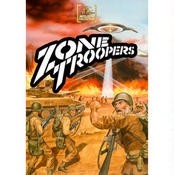 Zone Troopers, the earnest and goofy genre effort from 1985, is a fun amalgam of World War II-era combat movies and aliens on earth action-adventure-thrillers. With tongue planted firmly in cheek, but without any air of pretension or condescension, it's a welcome discovery for those who―probably because of its silly VHS cover―passed it over on the rental shelves in years past. M-G-M's Limited Edition Collection does a pretty good job with this obscure release, delivering a great-looking print of nostalgic, pulp-style movie, one deserving of a wider audience and maybe, someday, a disc with some cool extras. Gritty, exciting and daft―and featuring Tim Thomerson's spot-on performance as Sergeant Stone―this M.O.D. disc of Zone Troopers will do for now.
Zone Troopers, the earnest and goofy genre effort from 1985, is a fun amalgam of World War II-era combat movies and aliens on earth action-adventure-thrillers. With tongue planted firmly in cheek, but without any air of pretension or condescension, it's a welcome discovery for those who―probably because of its silly VHS cover―passed it over on the rental shelves in years past. M-G-M's Limited Edition Collection does a pretty good job with this obscure release, delivering a great-looking print of nostalgic, pulp-style movie, one deserving of a wider audience and maybe, someday, a disc with some cool extras. Gritty, exciting and daft―and featuring Tim Thomerson's spot-on performance as Sergeant Stone―this M.O.D. disc of Zone Troopers will do for now.
And Paul Mavis reviewed Vice Squad, Edward G. Robison's socko 1953 noir policer, The Big Caper, another good B- noir from 1957 starring Rory Calhoun and James Gregory, The Andy Hardy Collection, Volume 1, a six-movie grouping of the beloved Mickey Rooney classics, Tall Story, Josh Logan's sweet sports comedy from 1960 starring Anthony Perkins and Jane Fonda, The Thousand Plane Raid, a workmanlike WWII actioner from 1969 starring Christopher George, 1970's sex comedy, Pussycat, Pussycat, I Love You, starring Ian McShane, Diary of a Bachelor, the indie sex comedy from 1964, Impasse, an early Burt Reynolds adventure film from 1969, AIP's 1976 actioner, A Small Town in Texas, starring Timothy Bottoms and Susan George, Inside Out, the 1975 caper flick starring Telly Savalas and James Mason, You Can't Get Away With Murder, a classic Warner Bros.' prison meller from 1938, starring Humphrey Bogart and Billy Hallop, The Savage Wild, an interesting nature documentary from Gordon Eastman, The First Time, a 1969 sex comedy starring Jacqueline Bisset, Hannibal Brooks, director Michael Winner's terrific WWII action/comedy from 1969, starring Oliver Reed and Michael J. Pollard, The Bed-Sitting Room, the completely mad U.K. farce from 1969 starring Peter Cook and Dudley Moore, Something Wild, the expressionistic 1961 rape drama starring Carroll Baker and Ralph Meeker, Inside Out, an indie effort from 1986 starring Elliott Gould as an agoraphobic, Rhapsody in Blue, the 1946 Warner Bros. bio of George Gershwin, starring Robert Alda and Alexis Smith, Hell Boats, the 1970 WWII programmer starring James Franciscus, Hornets' Nest, another WWII actioner from 1970, this time starring Rock Hudson, and 1973's The Slams, a gritty prison exploitation flick starring big, bad Jim Brown:
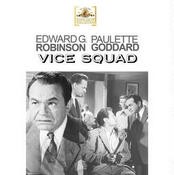 Entertaining, at times even brilliant little noir "B" programmer from M-G-M's M.O.D. program, the Limited Edition Collection. Vice Squad the 1953 United Artists police procedural from celebrated Levy-Gardner-Laven, starring Edward G. Robinson, Paulette Goddard, Porter Hall, Adam Williams, Edward Binns, and Lee Van Cleef, sets out to portray one hectic day in the life of a L.A. Captain of Detectives Vice Squad expertly juggles several storylines, creating quite a bit of suspense―and humor―as old pro Robinson sets those lazy reptilian eyes in a perpetual squint, sneering at the various criminals, lawyers, and politicians who make his impossible job all the more difficult. No extras for this good-looking transfer.
Entertaining, at times even brilliant little noir "B" programmer from M-G-M's M.O.D. program, the Limited Edition Collection. Vice Squad the 1953 United Artists police procedural from celebrated Levy-Gardner-Laven, starring Edward G. Robinson, Paulette Goddard, Porter Hall, Adam Williams, Edward Binns, and Lee Van Cleef, sets out to portray one hectic day in the life of a L.A. Captain of Detectives Vice Squad expertly juggles several storylines, creating quite a bit of suspense―and humor―as old pro Robinson sets those lazy reptilian eyes in a perpetual squint, sneering at the various criminals, lawyers, and politicians who make his impossible job all the more difficult. No extras for this good-looking transfer.
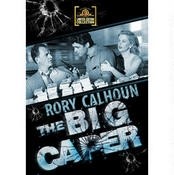 Trim little "B" noir...with a nicely perverse subtext. The Big Caper, based on Lionel White's pulp thriller and starring Rory Calhoun, Mary Costa, James Gregory, and Corey Allen was directed by Robert Stevens for economical terseness―no doubt insisted upon by "Dollar Bills" producers Howard B. Pine and William C. Thomas. The Big Caper isn't as well known as The Killing, Stanley Kubrick's 1956 adaptation of another White heist novel...but it delivers the crime action goods while giving a deviant little poke in the eye to pop culture's stereotypical view of 1950s America. No extras for this razor-sharp transfer.
Trim little "B" noir...with a nicely perverse subtext. The Big Caper, based on Lionel White's pulp thriller and starring Rory Calhoun, Mary Costa, James Gregory, and Corey Allen was directed by Robert Stevens for economical terseness―no doubt insisted upon by "Dollar Bills" producers Howard B. Pine and William C. Thomas. The Big Caper isn't as well known as The Killing, Stanley Kubrick's 1956 adaptation of another White heist novel...but it delivers the crime action goods while giving a deviant little poke in the eye to pop culture's stereotypical view of 1950s America. No extras for this razor-sharp transfer.
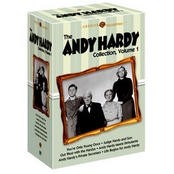 A delight for fans...but incomplete. Warner Bros.' Archive Collection has released The Andy Hardy Collection, Volume 1, a scattershot attempt to sample the first two-thirds of the iconic, 16-film M-G-M "B" series that starred "Mighty Mite" Mickey Rooney, Lewis Stone, Cecilia Parker, Fay Holden, Sara Haden, and Ann Rutherford. The six titles included here are 1937's You're Only Young Once, 1938's Out West with the Hardys, 1939's Judge Hardy and Son, 1940's Andy Hardy Meets Debutante, and 1941's Andy Hardy's Private Secretary and Life Begins for Andy Hardy (leaving out opener A Family Affair, Judge Hardy's Children, Love Finds Andy Hardy, The Hardys Ride High, and Andy Hardy Gets Spring Fever, if you wanted to watch the series in order, to Life Begins). Of course, I'm not going to recommend you "skip" an opportunity to see these six delightful Hardy films, particularly since they've been so long in coming to DVD (after all, there could be rights considerations I'm unaware of). However, it is a major disappointment for serious movie fans―the very people to whom the Archive is trying to cater―not to get this landmark series started off in complete, proper release order. Solid transfers and original trailers help, though.
A delight for fans...but incomplete. Warner Bros.' Archive Collection has released The Andy Hardy Collection, Volume 1, a scattershot attempt to sample the first two-thirds of the iconic, 16-film M-G-M "B" series that starred "Mighty Mite" Mickey Rooney, Lewis Stone, Cecilia Parker, Fay Holden, Sara Haden, and Ann Rutherford. The six titles included here are 1937's You're Only Young Once, 1938's Out West with the Hardys, 1939's Judge Hardy and Son, 1940's Andy Hardy Meets Debutante, and 1941's Andy Hardy's Private Secretary and Life Begins for Andy Hardy (leaving out opener A Family Affair, Judge Hardy's Children, Love Finds Andy Hardy, The Hardys Ride High, and Andy Hardy Gets Spring Fever, if you wanted to watch the series in order, to Life Begins). Of course, I'm not going to recommend you "skip" an opportunity to see these six delightful Hardy films, particularly since they've been so long in coming to DVD (after all, there could be rights considerations I'm unaware of). However, it is a major disappointment for serious movie fans―the very people to whom the Archive is trying to cater―not to get this landmark series started off in complete, proper release order. Solid transfers and original trailers help, though.
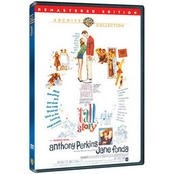 Delightful, quirky, satiric college sex comedy. Tall Story, the 1960 Joshua Logan-directed comedy starring Anthony Perkins and Jane Fonda, was based on the minor Broadway hit from celebrated playwrights Lindsay and Crouse. Combining and spoofing all sorts of subgenres―the college comedy, the sex comedy, the sports comedy, the teen comedy―Tall Story didn't click with audiences or big city critics when it first appeared, but now it plays as one of the better studio comedies from that transitional period. An original trailer is included in this superior-looking remastered black and white widescreen transfer.
Delightful, quirky, satiric college sex comedy. Tall Story, the 1960 Joshua Logan-directed comedy starring Anthony Perkins and Jane Fonda, was based on the minor Broadway hit from celebrated playwrights Lindsay and Crouse. Combining and spoofing all sorts of subgenres―the college comedy, the sex comedy, the sports comedy, the teen comedy―Tall Story didn't click with audiences or big city critics when it first appeared, but now it plays as one of the better studio comedies from that transitional period. An original trailer is included in this superior-looking remastered black and white widescreen transfer.
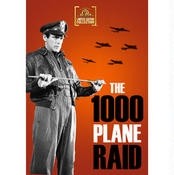 Low-budget, low-key (and perhaps a tad too familiar) WWII tale, competently directed and performed. M-G-M's own M.O.D. The Thousand Plane Raid (the DVD cover lists it as The 1000 Plane Raid), a 1969 war drama from Mirisch Films and United Artists, directed by Boris Sagal and starring Christopher George, Laraine Stephens, Gary Marshal, and a host of familiar movie and TV faces, will likely disappoint those looking for a glossy, star-studded, action-packed, big-budget epic along the lines of 1969's similar Battle of Britain. Loyal fans of the WWII action genre, however, will probably enjoy it...even if they've seen this all done before. An original trailer is included.
Low-budget, low-key (and perhaps a tad too familiar) WWII tale, competently directed and performed. M-G-M's own M.O.D. The Thousand Plane Raid (the DVD cover lists it as The 1000 Plane Raid), a 1969 war drama from Mirisch Films and United Artists, directed by Boris Sagal and starring Christopher George, Laraine Stephens, Gary Marshal, and a host of familiar movie and TV faces, will likely disappoint those looking for a glossy, star-studded, action-packed, big-budget epic along the lines of 1969's similar Battle of Britain. Loyal fans of the WWII action genre, however, will probably enjoy it...even if they've seen this all done before. An original trailer is included.
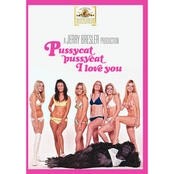 Pussycat, pussycat...I don't hate you. I just find you rather desperate and completely unfunny. So please go away. Pussycat, Pussycat, I Love You , the ersatz "sequel" to Woody Allen's What's New, Pussycat?, released by United Artists in 1970, starring Ian McShane and a god-awful Severn Darden, with equally ridiculous John Gavin and Joyce Van Patten inexplicably along for the ride, didn't satisfy anyone when it came out. Regular readers of mine (all three of you) know that it doesn't take much in a movie like this to make me happy. So when I write that Pussycat, Pussycat, I Love You made me very unhappy...you can believe it. No extras for this good-looking transfer.
Pussycat, pussycat...I don't hate you. I just find you rather desperate and completely unfunny. So please go away. Pussycat, Pussycat, I Love You , the ersatz "sequel" to Woody Allen's What's New, Pussycat?, released by United Artists in 1970, starring Ian McShane and a god-awful Severn Darden, with equally ridiculous John Gavin and Joyce Van Patten inexplicably along for the ride, didn't satisfy anyone when it came out. Regular readers of mine (all three of you) know that it doesn't take much in a movie like this to make me happy. So when I write that Pussycat, Pussycat, I Love You made me very unhappy...you can believe it. No extras for this good-looking transfer.
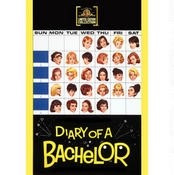 A "nudie cutie" that's only so-so cutie...and not at all nudie. Diary of a Bachelor, the minuscule-budgeted indie released by American International Pictures in 1964, directed by famed exploitation producer Sandy Howard, written by Freddie Francis (under a well-advised pseudonym), and starring William Traylor as "The Bachelor," is a breezy little dirty joke with just a smidgeon of dirt in it. Diary of a Bachelor could have been a lot more fun it fully embraced its latent nudie cutie urges, or if it had concentrated on a more interesting bachelor here, played by the marvelous Joe Silver. Still...Diary of a Bachelor moves along quickly enough, it's racier than anything Doris Day was doing at the time, and some of the performances are quite bright―a curiosity piece for anyone interested in indie filmmaking from that period. No extras for this razor-sharp and white transfer.
A "nudie cutie" that's only so-so cutie...and not at all nudie. Diary of a Bachelor, the minuscule-budgeted indie released by American International Pictures in 1964, directed by famed exploitation producer Sandy Howard, written by Freddie Francis (under a well-advised pseudonym), and starring William Traylor as "The Bachelor," is a breezy little dirty joke with just a smidgeon of dirt in it. Diary of a Bachelor could have been a lot more fun it fully embraced its latent nudie cutie urges, or if it had concentrated on a more interesting bachelor here, played by the marvelous Joe Silver. Still...Diary of a Bachelor moves along quickly enough, it's racier than anything Doris Day was doing at the time, and some of the performances are quite bright―a curiosity piece for anyone interested in indie filmmaking from that period. No extras for this razor-sharp and white transfer.
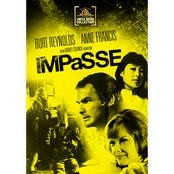 Another Aubrey Schenck-produced sweaty he-man action adventure, ripped from the pages of Argosy and For Men Only. Impasse, the 1969 actioner from United Artists starring Burt Reynolds, Anne Francis, Miko Mayama, Lyle Bettger, Rodolfo Acosta, and Jeff Corey, has evocative Philippine location work and a no-nonsense approach to its straightforward heist plot, delivering pulpy genre work that's entirely respectable. No extras for this good-looking transfer.
Another Aubrey Schenck-produced sweaty he-man action adventure, ripped from the pages of Argosy and For Men Only. Impasse, the 1969 actioner from United Artists starring Burt Reynolds, Anne Francis, Miko Mayama, Lyle Bettger, Rodolfo Acosta, and Jeff Corey, has evocative Philippine location work and a no-nonsense approach to its straightforward heist plot, delivering pulpy genre work that's entirely respectable. No extras for this good-looking transfer.
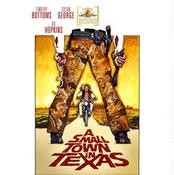 Watchable exploitation actioner...but only just. A Small Town in Texas, the 1976 American International flick starring Timothy Bottoms, Susan George, and Bo Hopkins, and helmed by Race With the Devil's Jack Starrett, is a cleanly-directed, straightforward revenge story...with almost no context. A Small Town in Texas sported some wowzer car stunts (for 1976, at least), and a good turn by evil Hopkins...but that's about all, disappointing drive-in fans then and now who expect some hard-core action and a little T & A from this kind of set-up. No extras for this good-looking transfer.
Watchable exploitation actioner...but only just. A Small Town in Texas, the 1976 American International flick starring Timothy Bottoms, Susan George, and Bo Hopkins, and helmed by Race With the Devil's Jack Starrett, is a cleanly-directed, straightforward revenge story...with almost no context. A Small Town in Texas sported some wowzer car stunts (for 1976, at least), and a good turn by evil Hopkins...but that's about all, disappointing drive-in fans then and now who expect some hard-core action and a little T & A from this kind of set-up. No extras for this good-looking transfer.
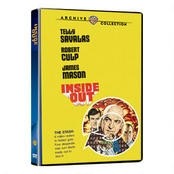 Shorthand 70s international heist comedy: completely improbable, often dopey...but entertaining for that hapless breeziness. Inside Out, the 1975 heist comedy from Warners starring Telly Savalas, Robert Culp, James Mason, and Aldo Ray, is a sometimes shaky, lower-budget international "deal picture" production if I ever saw one. Inside Out doesn't bother to explain a lot of things about its plot to snatch long-buried Nazis gold in East Germany, but somehow you don't seem to mind because the pace is swift, while actors look thoroughly bemused at the ridiculousness of the enterprise. No extras for this okay-looking transfer.
Shorthand 70s international heist comedy: completely improbable, often dopey...but entertaining for that hapless breeziness. Inside Out, the 1975 heist comedy from Warners starring Telly Savalas, Robert Culp, James Mason, and Aldo Ray, is a sometimes shaky, lower-budget international "deal picture" production if I ever saw one. Inside Out doesn't bother to explain a lot of things about its plot to snatch long-buried Nazis gold in East Germany, but somehow you don't seem to mind because the pace is swift, while actors look thoroughly bemused at the ridiculousness of the enterprise. No extras for this okay-looking transfer.
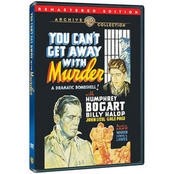 Soulful, well-acted gangster/prison combo from the mean streets of the Warner Bros.' lot. You Can't Get Away With Murder, the 1939 action meller based on a play by real-life Sing Sing Penitentiary Warden Lewis E. Lawes, starring Humphrey Bogart, Gale Page, the Dead End Kids' Billy Halop, John Litel, and Henry Travers, isn't as well known as some of Bogie's other gangster pics from this period (probably because he's really only a supporting player here to the excellent Billy Halop). You Can't Get Away With Murder's title doesn't leave a lot of room for speculation as to where all the criminals are going to wind up at the end of the movie, but as with so many of these Warner urban efforts from this period, it's fast-paced, exciting, and pleasantly reflective from time to time. An original trailer is included in this super-sharp remastered edition.
Soulful, well-acted gangster/prison combo from the mean streets of the Warner Bros.' lot. You Can't Get Away With Murder, the 1939 action meller based on a play by real-life Sing Sing Penitentiary Warden Lewis E. Lawes, starring Humphrey Bogart, Gale Page, the Dead End Kids' Billy Halop, John Litel, and Henry Travers, isn't as well known as some of Bogie's other gangster pics from this period (probably because he's really only a supporting player here to the excellent Billy Halop). You Can't Get Away With Murder's title doesn't leave a lot of room for speculation as to where all the criminals are going to wind up at the end of the movie, but as with so many of these Warner urban efforts from this period, it's fast-paced, exciting, and pleasantly reflective from time to time. An original trailer is included in this super-sharp remastered edition.
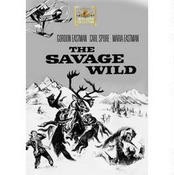 Entertaining, gorgeously-photographed nature "docudrama." The Savage Wild, the 1970 documentary released by American International Pictures, and narrated, produced, directed and lensed by famed nature photographer and outdoorsman Gordon Eastman (who also stars here and writes a song if that isn't enough for you), shows nothing too savage here in this relatively straightforward look at some cute (but vicious) wolf cubs in the Yukon territory. So kids and families will be the best bet for this enjoyable, informative indie from way, way back. No extras for this terrific-looking transfer.
Entertaining, gorgeously-photographed nature "docudrama." The Savage Wild, the 1970 documentary released by American International Pictures, and narrated, produced, directed and lensed by famed nature photographer and outdoorsman Gordon Eastman (who also stars here and writes a song if that isn't enough for you), shows nothing too savage here in this relatively straightforward look at some cute (but vicious) wolf cubs in the Yukon territory. So kids and families will be the best bet for this enjoyable, informative indie from way, way back. No extras for this terrific-looking transfer.
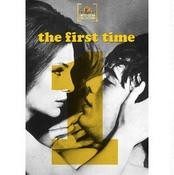 Innocuous, forgettable "coming of age" dramedy featuring two of the Eight Wonders of the World in 1969: Niagara Falls, and a heartbreakingly beautiful Jackie Bisset. The First Time, the 1969 programmer from the Mirisch Company, released by United Artists, and starring Jacqueline Bisset, West Stern, Rick Kelman, and Wink Roberts, has some good (but excessive) location work in Canada, pushing The First Time dangerously close to travelogue status. However, the dirty-minded-but-spotlessly-clean script may prove mildly agreeable if you want to spend an hour and a half in the company of lovely Jackie. An original trailer (with a different title) is included here on this terrific-looking transfer.
Innocuous, forgettable "coming of age" dramedy featuring two of the Eight Wonders of the World in 1969: Niagara Falls, and a heartbreakingly beautiful Jackie Bisset. The First Time, the 1969 programmer from the Mirisch Company, released by United Artists, and starring Jacqueline Bisset, West Stern, Rick Kelman, and Wink Roberts, has some good (but excessive) location work in Canada, pushing The First Time dangerously close to travelogue status. However, the dirty-minded-but-spotlessly-clean script may prove mildly agreeable if you want to spend an hour and a half in the company of lovely Jackie. An original trailer (with a different title) is included here on this terrific-looking transfer.
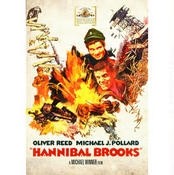 Captivating, offbeat WWII adventure. Hannibal Brooks, the 1969 Michael Winner-directed charmer from United Artists, written by Dick Clement and Ian Lafrenais (purportedly based in part on a true story), and starring Oliver Reed, Michael J. Pollard, Wolfgang Preiss, Helmut Lohner, Peter Carsten, Karin Baal, and Aida the Elephant as Lucy, is part animal picture, part WWII spoof, part anti-war film, and part pro-war film―no wonder it puzzled audiences and critics back in '69. Its gentle, even quizzical attitude about the horrors of war is as effective as its farcical spoofing and its genuinely touching love story a soldier and an elephant. An original trailer is included in this good-looking widescreen transfer.
Captivating, offbeat WWII adventure. Hannibal Brooks, the 1969 Michael Winner-directed charmer from United Artists, written by Dick Clement and Ian Lafrenais (purportedly based in part on a true story), and starring Oliver Reed, Michael J. Pollard, Wolfgang Preiss, Helmut Lohner, Peter Carsten, Karin Baal, and Aida the Elephant as Lucy, is part animal picture, part WWII spoof, part anti-war film, and part pro-war film―no wonder it puzzled audiences and critics back in '69. Its gentle, even quizzical attitude about the horrors of war is as effective as its farcical spoofing and its genuinely touching love story a soldier and an elephant. An original trailer is included in this good-looking widescreen transfer.
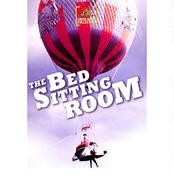 Alternately hilarious and quite chilling (and finally depressing) ultra-black sci-fi comedy. The Bed-Sitting Room, the 1969 United Artist release directed by Richard Lester, based on the play by comedian and co-star Spike Milligan and John Antrobus, starring Ralph Richardson, Michael Hordern, Arthur Lowe, Rita Tushingham, Peter Cook, Dudley Moore, Mona Washbourne, Harry Secombe, Roy Kinnear, and Marty Feldman, was a notorious flop during its original release. Since then, The Bed-Sitting Room has developed a minor cult following, perhaps more for the of so many iconic British comedy stars (Cook and Moore are probably the main drivers of that here), rather than for the frequently uncomfortable material. A trailer is included for this nice transfer.
Alternately hilarious and quite chilling (and finally depressing) ultra-black sci-fi comedy. The Bed-Sitting Room, the 1969 United Artist release directed by Richard Lester, based on the play by comedian and co-star Spike Milligan and John Antrobus, starring Ralph Richardson, Michael Hordern, Arthur Lowe, Rita Tushingham, Peter Cook, Dudley Moore, Mona Washbourne, Harry Secombe, Roy Kinnear, and Marty Feldman, was a notorious flop during its original release. Since then, The Bed-Sitting Room has developed a minor cult following, perhaps more for the of so many iconic British comedy stars (Cook and Moore are probably the main drivers of that here), rather than for the frequently uncomfortable material. A trailer is included for this nice transfer.
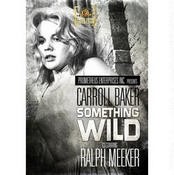 Disturbing; at times mesmerizing and perplexing. Something Wild, the 1961 indie drama released through United Artists, starring Carroll Baker, Ralph Meeker, Mildred Dunnock, Martin Kosleck, Doris Roberts, and Jean Stapleton, is a harsh, uncompromising look at the aftermath of a vicious rape...giving way unexpectedly to a strange, dreamy (and to some viewers, repellant) hostage/romance plot. Shot on the seamy streets of New York, and featuring two remarkable performances by the lead actors, Something Wild is something special. No extras for this black and white full-screen transfer.
Disturbing; at times mesmerizing and perplexing. Something Wild, the 1961 indie drama released through United Artists, starring Carroll Baker, Ralph Meeker, Mildred Dunnock, Martin Kosleck, Doris Roberts, and Jean Stapleton, is a harsh, uncompromising look at the aftermath of a vicious rape...giving way unexpectedly to a strange, dreamy (and to some viewers, repellant) hostage/romance plot. Shot on the seamy streets of New York, and featuring two remarkable performances by the lead actors, Something Wild is something special. No extras for this black and white full-screen transfer.
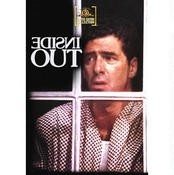 Quietly harrowing little interior drama, with an assured performance by Elliott Gould. Inside Out, the 1986 drama from M-G-M, written and directed by Robert Taicher, and starring Elliott Gould, Howard Hesseman, Jennifer Tilly, Beah Richards, and Dana Elcar, is a small, claustrophobic film that uses agoraphobia as its framework for some subtle commentary on modern life today. Inside Out probably got lost in all the turmoil when M-G-M was thought to be going bankrupt in 1986...but I doubt it would have achieved the level of acceptance that say, James L. Brooks' similar, slicker, sunnier As Good As It Gets did eleven years later: there's no "fun" to be had here at all. No extras for this good-looking transfer.
Quietly harrowing little interior drama, with an assured performance by Elliott Gould. Inside Out, the 1986 drama from M-G-M, written and directed by Robert Taicher, and starring Elliott Gould, Howard Hesseman, Jennifer Tilly, Beah Richards, and Dana Elcar, is a small, claustrophobic film that uses agoraphobia as its framework for some subtle commentary on modern life today. Inside Out probably got lost in all the turmoil when M-G-M was thought to be going bankrupt in 1986...but I doubt it would have achieved the level of acceptance that say, James L. Brooks' similar, slicker, sunnier As Good As It Gets did eleven years later: there's no "fun" to be had here at all. No extras for this good-looking transfer.
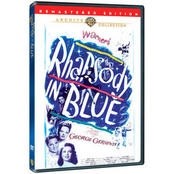 Not as snappy as you'd expect from the Brothers' Warner...but you do have all that marvelous Gershwin music. Rhapsody in Blue, the 1945 biopic of composer George Gershwin starring Robert Alda, Joan Leslie, Alexis Smith, Charles Coburn, Albert Bassermann, Morris Carnovsky, Rosemary DeCamp, and playing themselves, Oscar Levant, Paul "The King of Jazz" Whiteman, Al Jolson, George White, Hazel Scott and Anne Brown, is chock-full of Gershwin's driving, jazzy songs and compositions...and overflowing with bogus, trumped-up dramatics and bathos in an attempt to make its subject more "interesting." Hard to dislike from a musical standpoint, but it's a slog in-between. An original trailer is included.
Not as snappy as you'd expect from the Brothers' Warner...but you do have all that marvelous Gershwin music. Rhapsody in Blue, the 1945 biopic of composer George Gershwin starring Robert Alda, Joan Leslie, Alexis Smith, Charles Coburn, Albert Bassermann, Morris Carnovsky, Rosemary DeCamp, and playing themselves, Oscar Levant, Paul "The King of Jazz" Whiteman, Al Jolson, George White, Hazel Scott and Anne Brown, is chock-full of Gershwin's driving, jazzy songs and compositions...and overflowing with bogus, trumped-up dramatics and bathos in an attempt to make its subject more "interesting." Hard to dislike from a musical standpoint, but it's a slog in-between. An original trailer is included.
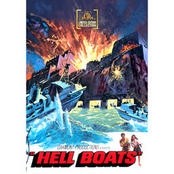 Workaday WWII adventure. Hell Boats, the 1970 WWII naval actioner from Mirisch Films' Oakmont Productions and released by United Artists, starring James Franciscus, Ronald Allen, Elizabeth Shepherd, and Reuven Bar-Yotam, and directed by talented Paul Wendkos, is languidly, hypnotically trite, but the sporadic action is okay in this junior-grade Guns of Navarone. No extras for this nice-looking widescreen transfer.
Workaday WWII adventure. Hell Boats, the 1970 WWII naval actioner from Mirisch Films' Oakmont Productions and released by United Artists, starring James Franciscus, Ronald Allen, Elizabeth Shepherd, and Reuven Bar-Yotam, and directed by talented Paul Wendkos, is languidly, hypnotically trite, but the sporadic action is okay in this junior-grade Guns of Navarone. No extras for this nice-looking widescreen transfer.
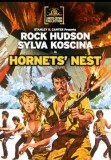 Interesting, little-seen mid-scale WWII actioner with some disturbing themes. Hornets' Nest, the 1970 United Artists release starring Rock Hudson, Sylva Koscina, Sergio Fantoni, and Mark Colleano, is directed in typical tough-guy fashion by Phil Karlson, providing the usual quota of late-sixties WWII action, along with some intriguing asides about the psychological effects of brutal, no-holds-barred warfare. An original trailer is included.
Interesting, little-seen mid-scale WWII actioner with some disturbing themes. Hornets' Nest, the 1970 United Artists release starring Rock Hudson, Sylva Koscina, Sergio Fantoni, and Mark Colleano, is directed in typical tough-guy fashion by Phil Karlson, providing the usual quota of late-sixties WWII action, along with some intriguing asides about the psychological effects of brutal, no-holds-barred warfare. An original trailer is included.
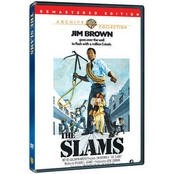 Violent, nasty blaxploitation/prison epic starring big, bad Jim Brown. The Slams, the 1973 M-G-M actioner co-starring gorgeous Judy Pace, Frank DeKova, and Ted Cassidy, is not referenced as often as Brown's more recognizable exploitation numbers from this period of his career. The Slams is crude and exciting filmmaking from scripter Richard DeLong Adams and director Jonathan Kaplan; it's a winner for anyone into this genre and time period. An original trailer is included in this good-looking transfer.
Violent, nasty blaxploitation/prison epic starring big, bad Jim Brown. The Slams, the 1973 M-G-M actioner co-starring gorgeous Judy Pace, Frank DeKova, and Ted Cassidy, is not referenced as often as Brown's more recognizable exploitation numbers from this period of his career. The Slams is crude and exciting filmmaking from scripter Richard DeLong Adams and director Jonathan Kaplan; it's a winner for anyone into this genre and time period. An original trailer is included in this good-looking transfer.
See you next time, right here at The M.O.D. Squad!
Archives
|
|

